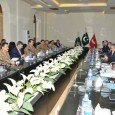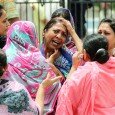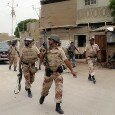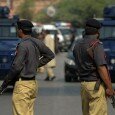By Muhammad Amir Rana –
Escalation in violence against politicians across the country has heightened security concerns ahead of the election
There have been several attacks on political activists in the north-western Khyber-Pakhtunkhwa and Sindh provinces in recent weeks, most of them on supporters of the Awami National Party (ANP), Muttahida Qumai Movement (MQM) and Pakistan Peoples Party (PPP), all partners of the coalition that headed the federal and provincial governments in KP and Sindh.
The coming weeks are more critical as terrorist organisations have openly stated that they would attack election rallies, polling stations and civilian voters. Although political parties are not taking risks of organising big rallies and have resorted to small gatherings and corner meetings as part of political campaign, holding elections in certain regions will be a tough task for the interim governments and law enforcement agencies, particularly in Balochistan, Karachi, and parts of KP and FATA.
A look into the current state of insecurity in the country shows thtat a total of 152 terrorist attacks were reported across Pakistan, including five suicide blasts, in the month of March, representing an increase of about 18 percent as compared to the previous month, which left 220 people dead, 11 percent less than those killed in such attacks in the previous month, and 483 others injured.
The increase in the number of terrorist attacks was largely contributed by the heightened attacks by nationalist insurgents in Balochistan and by the Taliban militants in KP. A review of geographical spread of terrorist attacks in the restive province reveals that the presence and operational activities of Tehreek-e-Taliban Pakistan (TTP), local Taliban and other brands of militants are not confined to certain areas.
In terms of casualties in terrorist attacks, Karachi was the most affected city among all the regions of Pakistan during in March. As many as 100 people were killed – representing a phenomenal rise in fatalities in terrorist attacks of over 194 percent compared to previous month – and 168 others were injured in Karachi – 460 percent more than the previous month – in a total of 36 reported terrorist attacks.
The gradually increasing number of the TTP-perpetrated terrorist attacks in Karachi indicates that the group has well consolidated its position there and increased its operational capability in different areas of the city. During the month of March, the banned group was involved in at least 22 terrorist attacks in Karachi that claimed the lives of 37 people — 14 policemen, eight Rangers personnel, one army soldier and 14 civilians — and injured another 30, mostly civilians. Most of these attacks (12) hit security forces including police, Rangers and army, and their check posts.
Precisely, some 80 attacks have been reported on the political leadership and workers since January to April 14 this year. These attacks have taken 78 lives of political workers and left 106 other injured. The attacks in KP were confined to Peshawar valley, where apart from TTP and LI, small militant groups influenced by TTP are active as well.
The question is: Can insecurity become a major constraint in holding the general elections? However, Gen (retd) Pervez Musharraf managed to hold elections during an almost similarly volatile situation. Why should not the Election Commission of Pakistan and a constitutionally appointed caretaker government be able to do so?
Statistically speaking, the security situation in Pakistan was not ideal in 2008, during the electoral campaign period. A comparison of the number of terrorist attacks and consequent casualties during these two periods, January to March in 2008 and the same period in 2013, suggests that the militants’ operational capacity has increased.
A major difference, however, is the adoption of a new attack tactic by Sunni sectarian militant groups: to engineer massive blasts in Shia-populated areas. This has significantly pushed up the casualty figures. On the whole, sectarian violence has increased in Pakistan in recent years and more significantly in the past few months, mainly in Quetta and Karachi. In the first two months of 2013, 60 sectarian-related terrorist attacks took 238 lives while during the corresponding period in 2008 only one such incident was reported, with no casualty.
As far as violence during elections is concerned, it appears that it might continue following the same trends, particularly sectarian violence. Notwithstanding the operational capabilities of terrorists, including factions of the Tehrik-i-Taliban Pakistan (TTP) and the Punjabi Taliban, it is imperative to look at the patterns.
First, consider the geographical spread of terrorist attacks. Currently, sectarian terrorist attacks are mostly confined to Karachi and Quetta, and the TTP and its affiliates are active in certain areas of FATA and KP. Usually, these groups prioritise the targeting of the security forces and pro-state tribal elders. So far this year, the TTP has killed 119 personnel of the security forces in 68 attacks; during the same time period in 2008, the security forces suffered 303 fatalities in 152 attacks.
In fact, the TTP started the systematic killing of political workers after the elections of 2008. They got their inspiration from the assassination of Benazir Bhutto. For the majority of the people, it was difficult to imagine that Benazir Bhutto’s assassination was the handiwork of terrorists, and this encouraged the latter.
In 2008, terrorists killed 31 political leaders and workers in KP, mainly belonging to the ruling ANP and the PPP. It is not hard to understand why: apart from having generally secular credentials, the government run by these parties was an ally of the U.S. Initially, only one faction of the TTP, led by Mullah Fazlullah, launched this campaign but later other groups also got involved.
The TTP and its affiliated groups are against the democratic system. They want to demolish the current democratic system in Pakistan and replace it with an Islamic caliphate system. But will they try to hit public places and rallies, which can further alienate them from society? At a time when terrorists have successfully created an atmosphere of fear for political parties, which are begging for peace, they would be foolish to dissipate this impression and be on the receiving end of public outrage by targeting rallies.
Barely four days after All Parties Conference, convened by Jamiat Ulema-e-Islam, announced its support for peace talks between TTP and political parties, the TTP released a horrific video with graphic images of brutal murder of six Pakistan Army troops by the militants. The army, even before the release of this video, criticised PML-N, JUI-F and JI leadership and called it a crude attempt on their part. It is important to know here that the APC convention didn’t ask TTP to lay down their arms as a pre-requisite for the talks; it didn’t even use the phrase of “terrorists” while referring to the Taliban.
Many experts believe that this footage was actually recorded in June 2012 but is being released now to pressurise the army to support the peace talks between TTP and political parties. The TTP has repeatedly stated in its statements that even though political parties are willing to negotiate, the army’s consent is crucial since the actual power lies in the hands of the army. It can be observed that political parties and the army are not on the same page when it comes to fighting terrorism in the country. It is important that the army and major political parties come up with a collective strategy in the war against terrorism.
This is, however, a clear sign for the government coming into power after May 11 elections that the military will formulate a comprehensive strategy to fight against militants and peace talks (at least for the moment) will not be taken into consideration. A quarterly meeting of the Joint Chiefs of Staff Committee that took place during the month decided that a comprehensive strategy will be followed by the armed forces to combat the terrorist threat being faced by the country.
The military also announced its support and assistance for the Election Commission of Pakistan in the forthcoming elections. This is important, especially after the TTP announced that it would target polling stations during the elections as they consider elections to be un-Islamic, an attack on any polling stations would not just be a threat to the state itself but also to the ideology of democracy.
As far as the current trend of insecurity is concerned, sectarian terrorism and ethno-political violence, mainly in Quetta and Karachi, may continue along a similar pattern, but the electoral process can, and may, continue. But in FATA it will be a difficult task to launch election campaigns, hold elections and convince people to come out to cast their votes.
The writer is a security analyst and heads the Pakistan Institute of Peace Studies (PIPS)






























































































